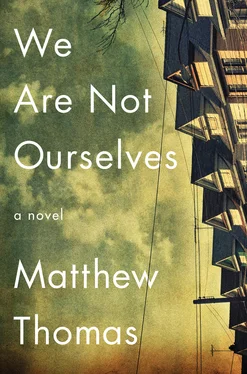On the way home, after they’d dropped everyone off, her mother blew smoke through the cracked window and talked with a quick and ceaseless fluency. Upbeat as her mother seemed, Eileen saw that the corners of her mouth were being pulled down, as though by a baited hook. She could tell that her mother didn’t entirely believe in her own forgiveness. Eileen wasn’t sure she believed in it herself, even though she’d been the one to grant it, through tears, after her mother had sat her down at the kitchen table and unearthed mistakes Eileen had successfully buried and said how sorry she was for them. Her mother had worked hard to kill the past, but it clung to life in Eileen’s mind, in the thought that this apparently solid form might dissolve back into the liquid that had seeped into every corner of her childhood, bringing disorder and rot. The smell of the past, that irrepressible smoke, was spoiling the air between them, where, in the absence of others to filter it, an acrid cloud now hung.
“Roll that down further, please.”
Without a word, her mother did as asked. She stared straight ahead, smoking and avoiding Eileen’s gaze as she used to at the height of her drinking days. Eileen pulled over and got out to roll down the rear windows. She stood briefly outside the car gazing at the back of her mother’s head, which for a strangely exhilarating moment looked as if it belonged to someone else. Whatever her mother was going through, Eileen would allow herself to care only so much about it. She had her own life to worry about. Life was what you made of it. Some of the houses she’d dropped these people off at would have been enough for her, so why couldn’t they be enough for them? If she lived in one of these houses, she wouldn’t need to get into another woman’s car and head to a damp lower church for a meeting. She could look at her fireplace, her leather sofa, her book-lined drawing room; she could listen to silence above her head; she could peer in on empty bedrooms lying in wait for fresh-faced visitors, pleasantly useless otherwise. It would all be enough for her to put a drink down for. And yet there these people were. The fact that they were there, that everything they owned wasn’t enough somehow, disturbed her, suggesting a bottomlessness to certain kinds of unhappiness. She shook the thought from her head like dust from an Oriental rug and decided that a house would have to be enough.
She spent the entire fall of 1963 trying to convince her cousin Pat to apply to college. Then December rolled in and the application deadlines were around the corner, and many of them had already come and gone. She went to him to make one final appeal.
“I’m not college material,” Pat said, his big feet up on the coffee table in her aunt Kitty’s apartment, where Eileen sat with her knees together under the pressed pleats of her cotton skirt.
“Bull.”
“I’ve never been big on school.” He leaned over and tapped ashes into a coffee cup, stretched back again.
“You could have been a great student. You’re smarter than all those boys.”
“You need to give up on this idea of me as a Future Leader of America.”
The truth was, she already had. He was smart enough to make it to his senior year without doing a lick of homework, and he possessed an intuitive ability to make men champion his causes that reminded her of her father’s own. He was pissing away his apparently unbearable promise at underage bars, but she didn’t care about that anymore. All she wanted was to keep him safe.
“You could get As in your sleep,” she said, “if you gave it a tiny bit of effort.” She crossed her legs and played with the pack of cigarettes. She resisted blowing away the smoke that was traveling in her direction.
“I can’t sit and study. I just get restless.”
“I’ll do the applications for you.”
“I need to move . I can’t be cooped up.” He snubbed out his cigarette and folded his hands behind his head.
“You’ll have plenty of chances to move in Vietnam,” she said bitterly. “Until you’re in the ground, that is.”
He turned eighteen that February, 1964, and she tried to get him to marry the girl he was dating, but he wouldn’t do it. When he graduated in June and received the notice to report for his physical, she was terrified, because he was a perfect specimen, big and strong and almost impossibly hale, with 20/10 vision, practically, and great knees despite the family curse, so there was zero chance of his getting declared 4F. She tried to get him to enlist in the National Guard to avoid a dangerous posting, and then after the Gulf of Tonkin resolution in August she was sure he’d find some college to enroll in, but instead a couple of weeks later he went to the recruiter for the Marines.
He’d been on the winning side of every fistfight he’d ever been in, so he might’ve thought he could simply stare down whatever trouble was to come. He went to Parris Island for basic, got further training as an antitank assaultman, and was assigned to Camp Lejeune, where he stayed until June of 1965, when he volunteered to go over after the first waves of the ground war had landed in South Vietnam.
He called before he left. She couldn’t picture him in a crew cut at the other end of the phone, wearing that one outfit they all seemed to wear, a polo shirt and chinos, as if they all shopped in the same store. All she could see in her mind’s eye was him standing in his St. Sebastian’s blazer, five grades behind her, shifting impatiently from foot to foot while she fixed his tie. He was the closest she’d ever had to a brother.
“You’d better stay alive,” she said.
“There are some scared-looking fellas I could hand the phone to if you want to give them a little pep talk. This is Pat you’re talking to. Pat Tumulty . I’ll see you in a while.”
“Fine.”
“Tell your father I’ll make him proud,” he said.
Her father had filled her cousin’s head with so much patriotic rhetoric that he thought he was embarking on a noble adventure.
“Don’t you even think about trying to impress him,” she said. “He’d never say so, but he’s scared to death that something’s going to happen to you.”
“He told you that?”
“He doesn’t have to say it for it to be obvious. He just wants you home in one piece. The bullshit around that man is piled so high you can’t even see him past it.”
“He’d take my place if they’d let him.”
“Even if that’s true, it doesn’t mean a goddamned thing. The only thing he’s ever been afraid of is regular life. Come home and live a regular life and impress me . Forget about my father.”
She could almost hear him straighten up.
“Tell him I’ll make him proud,” he said.
She sighed. “Tell him yourself. He’ll be where you left him, in that damned recliner. He doesn’t go anywhere. Everybody comes to him.”
“I will.”
“Good-bye, Pat,” she said, and then she thought, Good-bye, Pat , in case she was really saying it. She waited to hear him hang up.
She began to look forward to the day when she would take another man’s name. It was the thoroughgoing Irishness of Tumulty that bothered her, the redolence of peat bogs and sloppy rebel songs and an uproar in the blood, of a defeat that ran so deep it reemerged as a treacherous conviviality.
She’d grown up around so many Irish people that she’d never had to think much about the fact that she was Irish. On St. Patrick’s Day, when the city buzzed like a family reunion, she felt a tribal pride, and whenever she heard the plaintive whine of bagpipes, she was summoned to an ancient loyalty.
Читать дальше
Конец ознакомительного отрывка
Купить книгу












